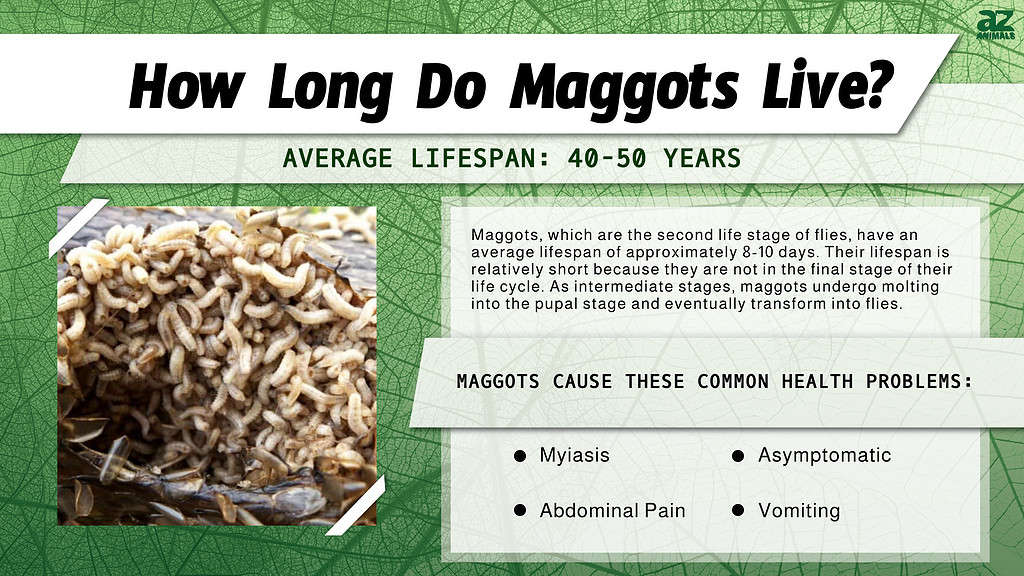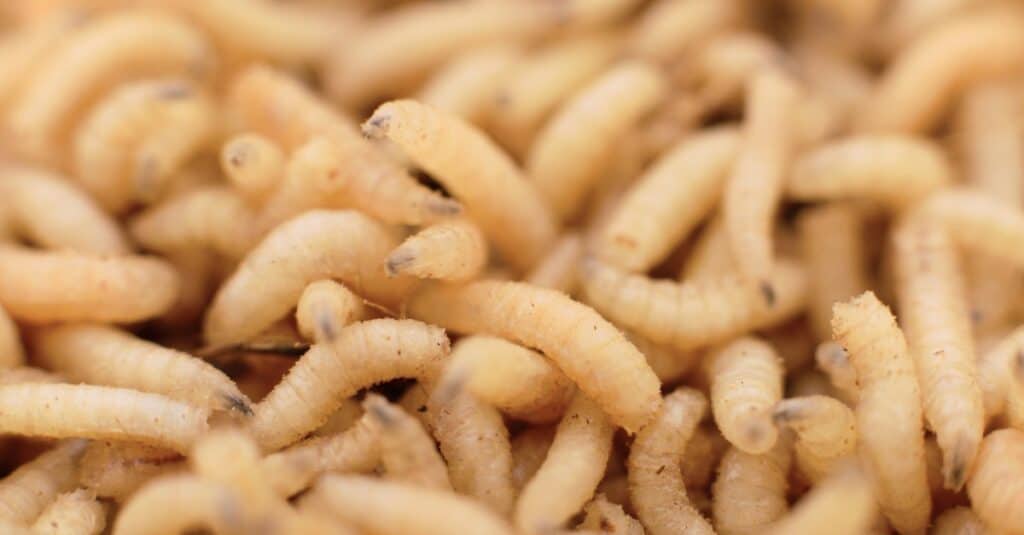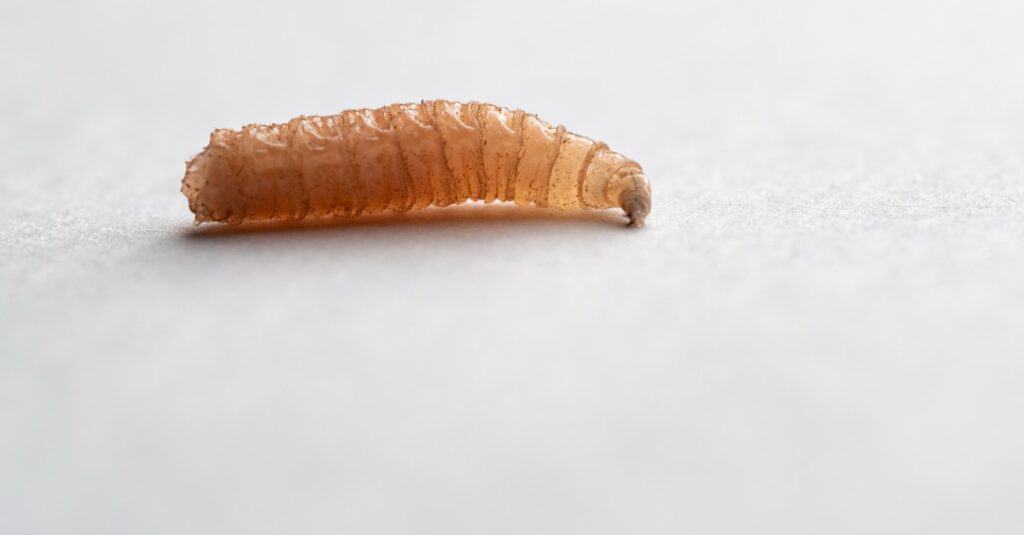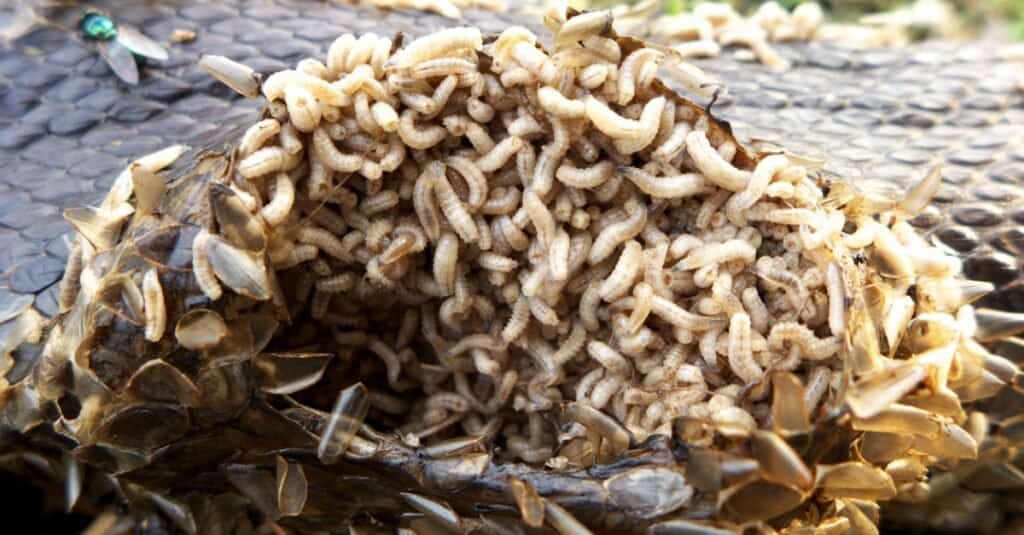
Do you happen to have a curiosity about strange and unusual animals? Then you’ll love learning about maggots. Few sights are as repulsive as maggots squirming through rotten food or decomposing roadkill. However, despite being associated with revulsion, maggots are pretty interesting and beneficial creatures.
Want to learn all about what makes this little larva so special? How long do maggots live? Read on to find out about them, including the maggot lifespan and what impacts their ability to grow from larva to full-grown fly.
Quick Crash Course On Maggots

Maggots have big appetites. This is why they can only exist in areas where there is plenty supply of decomposing food.
©iStock.com/Tsekhmister
A maggot is the larva of a fly. You can basically think of maggots as baby flies. Maggots have huge appetites. This is why they can only exist in areas where there is a plentiful supply of decomposing food. This includes corpses, garbage cans, and rotten fruit, among other things. This is why flies only lay their eggs in such locations. The organic stuff will already be decomposing, allowing the maggots to feast from the very start!
Their big appetites have a pretty interesting benefit. Flies colonizing flesh and laying their eggs allow forensic entomologists to determine the time of death of a dead body more precisely.
Some types of flies arrive and lay eggs in as little as a few minutes. So, by noting the numerous species present and evaluating the age of the maggot spawn crawling around in a cadaver, the minimal length of time that has transpired since death may be determined.
Remarkably, certain species are quite excellent at healing wounds and preventing infection. Maggot debridement treatment is not a new science. It has long been noticed that troops injured in combat recover quicker when their wounds are infected with maggots.
How Long Do Maggots Live?

Maggots have a lifespan of 8-10 days.
©iStock.com/Steve Jones
How long do maggots live? The average maggot lifespan is roughly 8-10 days. Maggots are technically the second life stage for flies. This is why their lifespan is not particularly long, as they are not at the final stage of their lifespan. Because maggots are intermediate stages in the life cycle of flies, they only live for around 8 – 10 days before molting into the pupal stage and turning into flies.
Research conducted into the average maggot lifespan also found that temperature greatly impacts whether the maggots will actually develop. The Lixophaga diatraeae fly uterus developed embryos at all constant temperatures tested (16-34°C), but maggots died before hatching when the flies were kept at 34°C. It was discovered that at temperatures ranging from 16 to 30°C (except for females at 28°C), the average adult lifetime surpassed 20 days, but at 32 and 34°C, lifespan was decreased.
It seems that temperature has a greater impact on maggot lifespan than was originally perceived. Pretty fascinating stuff!
The Average Maggot Life Cycle
The average maggot life cycle would also best be described as the fly life cycle. Maggots are an intermediate phase of flies. A maggot is not an animal in and of itself but rather a step in the life cycle of a fly that begins with the hatching of the egg and ends with the pupal stage. However, below, we’ll focus on the entire life cycle of the fly while also paying particular attention to the maggot stage.
Eggs
The egg is the initial stage of the fly’s life cycle. Female flies deposit eggs after mating, and male flies fertilize them. Flies deposit their eggs in warm, damp environments, frequently on decaying organic matter like food waste, trash, carcasses, or animal or human feces. It takes between 8 and 20 hours for fly eggs to hatch.
Maggot Phase
The maggot phase can be broken down into three specific stages: first-instar, second-instar, and third-instar larvae. The hatching larvae are creamy-white and are 2–3 mm in length. These first-instar larvae are avid eaters, feeding on the food items all around them. When the larvae reach the size of 10 mm, they begin the second larval stage. At this stage, the larvae continue to eat and molt or lose their skin for the first time.
As the larvae continue to feed, they develop to a height of 15 – 20 mm. Their hues range from milky to light brown to reddish. At this stage, they molt once again. The major feeding stage of the fly is comprised of these three instar stages. Maggots are voracious feeders that may eat nonstop for 24 hours. The feeding ability of maggots is the foundation of maggot treatment. The adult larva is ready to pupate after the feeding stage and goes to drier areas. It pupates after forming a reddish-brown covering around itself.
Pupae
The larva enters the pupa stage after the last molting. Flies are normally inactive at this stage, meaning they don’t move or eat. They form a cocoon-like shell and sprout wings, antennae, and legs. Flies are completely developed and in their adult form after they break free from their shell.
What Factors Impact The Maggot Lifespan?

It has been discovered that fruit fly maggots have cannibalistic tendencies.
©iStock.com/SorJongAng
Maggots have a relatively short lifespan. This is because they are a middle stage for flies. However, it is imperative that they survive into adulthood for the flies to develop finally. Since they are relatively small and defenseless, several factors impact the maggot’s lifespan.
Some of these factors include:
- Temperature: The temperature that they live in will have a significant impact on the maggots. If it is too cold for them, they will not live for long and will not make it to the next stage of their development. The same can be said for the temperature if it is too hot for them. They require an ideal external environment to continue development.
- Predators: If maggots come into contact with predators, they cannot complete their life cycle. They have a variety of natural predators who hunt them in the wild. Some of these predators include wasps, spiders, certain bird species such as chickens, lizards, flytrap plants, some species of fish, and even other maggots.
- Lack of food: Because they have various dietary options, maggots frequently live and reach the pupation stage. However, maggots must consume as much food as possible to store energy before transforming into a pupa and then into an adult fly. They can only survive for two to three days without food or water.
The photo featured at the top of this post is © Astrid Gast/Shutterstock.com
Thank you for reading! Have some feedback for us? Contact the AZ Animals editorial team.






